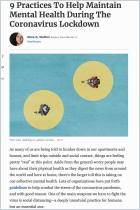Join getAbstract to access the summary!

Join getAbstract to access the summary!
Shaka Senghor
What 4 Years in Solitary Confinement Taught Me About Surviving Isolation
I turned my prison cell into a space of enlightenment, creativity, and higher learning
Medium, 2020
What's inside?
If Shaka Senghor can turn solitary confinement into a place of enlightenment, you can make the most of being home.
Recommendation
In October 1999, Shaka Senghor was thrust into a dreadful new reality – a six-foot by nine-foot cell. Not knowing when he’d be allowed to leave the confined space, he underwent a period of anger and resentment – but then he set to work expanding his soul and transforming himself so his punishing environment became a place of light and learning. People have compared COVID-19 shelter-in-place orders to being in prison. It’s easy to imagine why such a comparison might rankle someone who has actually experienced the most abusive form of prison life; but, with characteristic empathy, Senghor shares his hard-won tips for how to thrive – and grow – in very limiting circumstances.
Summary
About the Author
Shaka Senghor is the author of Writing My Wrongs: Life, Death and Redemption in an American Prison. He’s a director’s fellow at the MIT Media Lab, and he teaches classes for the Atonement Project.




















Comment on this summary